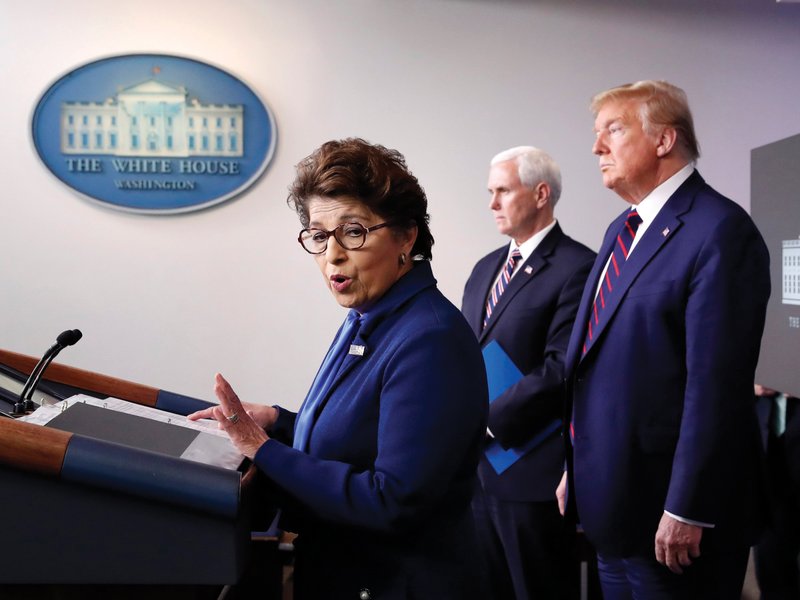The Trump administration launched a $350 billion small-business lending effort Friday amid concerns that the program's infrastructure, finalized just hours before going live, wasn't ready for the flood of millions of people expected to seek help.
Bank of America said it already had received 10,000 applications by midmorning for the $349 billion Paycheck Protection Program that is a key element of the $2 trillion rescue package passed by Congress last week.
Roughly 5,200 loans valued at $1.8 billion have been processed so far, said Jovita Carranza, administrator of the Small Business Administration, on Friday afternoon.
Administration officials have sharply streamlined procedures, hoping for a same-day approval process that is unheard of in the history of small-business lending.
[CORONAVIRUS: Click here for our complete coverage » arkansasonline.com/coronavirus]
Brian Moynihan, Bank of America's chief executive officer, told CNBC on Friday that the bank was taking applications first from existing clients, then from small businesses that have accounts with the bank but had never taken a loan before.
But JPMorgan Chase, the country's largest lender, had said it did not expect to begin accepting applications for the program Friday. Others banks said they were accepting applications but didn't expect to process or approve them until after the Treasury Department and Small Business Administration finalize rules for the program.
Some banking officials have warned that the abbreviated review process ― which allows borrowers to attest to their own eligibility without the government's approval ― will make the program a magnet for fraud. Although the SBA will be able to audit lenders and borrowers later, it will fall primarily to private bankers to make decisions about who should receive taxpayer-backed loans.
There is a concern that a crush of applications will overwhelm the private banking system.
[Video not showing up above? Click here to watch » https://www.youtube.com/watch?v=FpCbaU8_qwg]
"Just the scale of requests is going to cause the system to break down ... just the fundamental infrastructure of some of [the banks'] Web portals won't be able to handle it," said Hicham Oudghiri, CEO of Enigma Technologies, a small-business-focused data analytics and fraud detection company. He said most of his company's banking clients plan to start rolling out the new loans after a week or more.
Terms for loans taken under the Paycheck Protection Program are designed to be especially favorable to borrowers, with ultra-low interest rates, no payments for the first six months, and the opportunity to have the loan completely forgiven if employees can be kept on payroll throughout the crisis. And the loans will apply to a broad swath of the U.S. business community, including an array of businesses, sole proprietors and independent contractors.
"This is an unprecedented expansion of SBA lending that will take some time before it's fully functioning," said Rob Nichols, president of the American Bankers Association.
While Bank of America said it was moving quickly to meet loan requests, the policy of accepting applications first from current loan holders frustrated some customers.
"Even as a small business client, I cannot apply because we do not have a lending relationship with you -- we have never required debt until now," Lindsey Johnson, the founder of Weezie Towels, said on Twitter.
Goldman Sachs, the storied Wall Street bank, is not planning to directly participate in the new program but announced Thursday it is setting aside $300 million for small-business lending in response to the pandemic and will lend $25 million to smaller banks participating in the program.
"Our hope is that with immediate cash loans and the necessary stimulus to lending institutions, we can help provide the time these businesses need to weather this crisis," David Solomon, CEO of Goldman Sachs, said in a statement.
In a mark of the frenetic pace with which federal agencies are trying to get money out the door, final regulations were not released until Thursday evening, less than 24 hours before the program was expected to begin.
Bankers reviewing the regulations for the first time wondered how they could be expected to disburse funds the next day.
"Having just received guidance outlining how to implement a $349 billion program literally hours before it starts, we would ask for everyone to be patient as banks move heaven and earth to get a system in place and running to help America's small businesses and the millions of men and women who work at them," Richard Hunt, president and CEO of the Consumer Bankers Association, said in a statement.
Late Thursday evening, Cynthia Blankenship, corporate president of Bank of the West, said she was frantically reviewing the new rules.
The Grapevine, a Texas-based bank that has been a Small Business Administration lender since the 1980s, already has several applications from existing customers and also received referrals from other banks still leery of the program, she said.
"This is all coming at us so fast, and we're just trying to keep up," Blankenship said. "It's been like drinking from a fire hose."
The federal guidance addressed many of the industry's concerns. Banks aren't required to verify the accuracy of the documents a borrower submits with an application, removing the risk that the lender could be held liable for fraudulent behavior by the small business.
"This should reduce greatly the risk that the government could go after lenders if they process applications in which the borrower has submitted inaccurate or fraudulent information," Jaret Seiberg, a policy analyst for Cowen Washington Research Group, said in a research note.
Business on 04/04/2020

